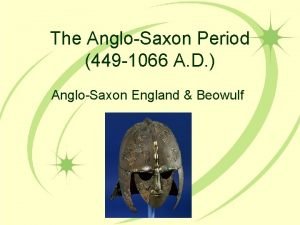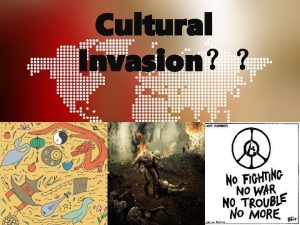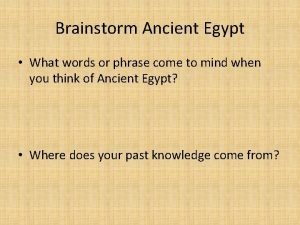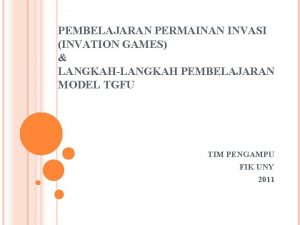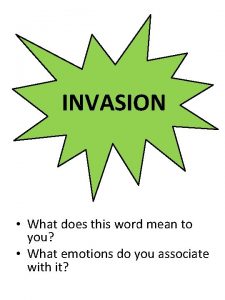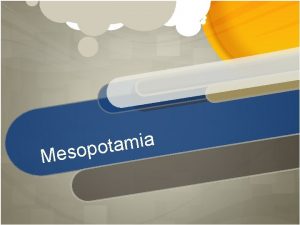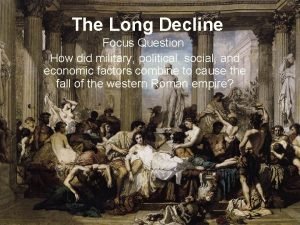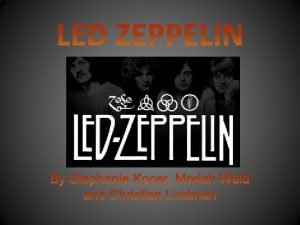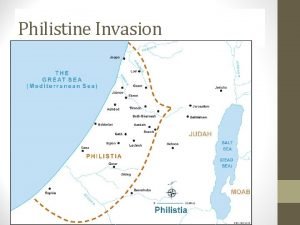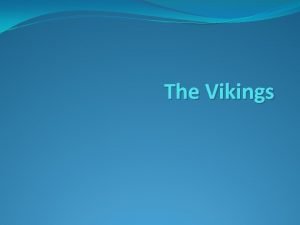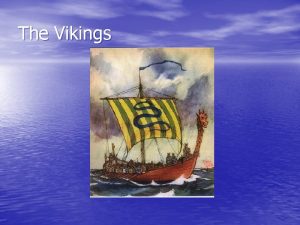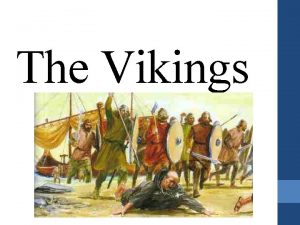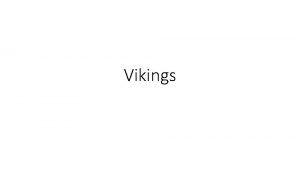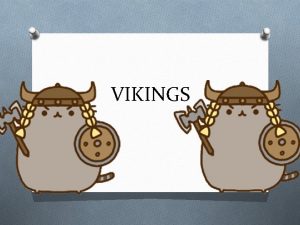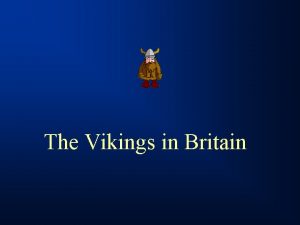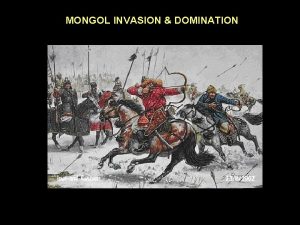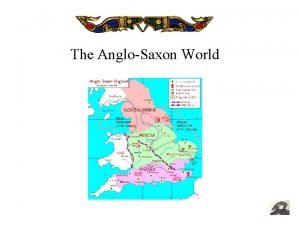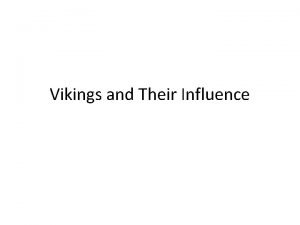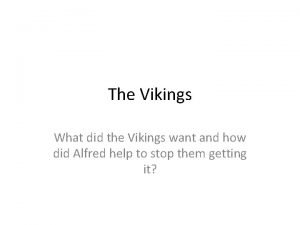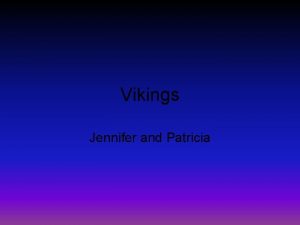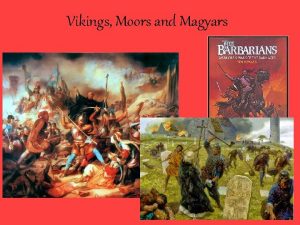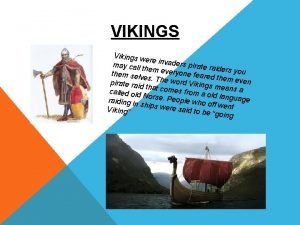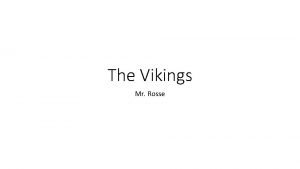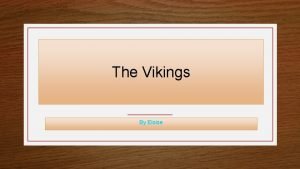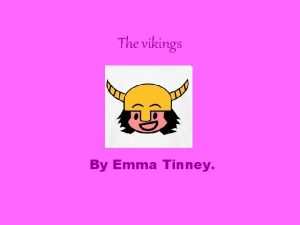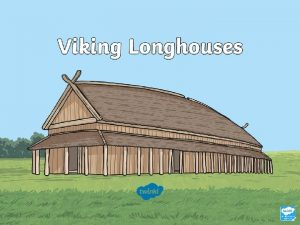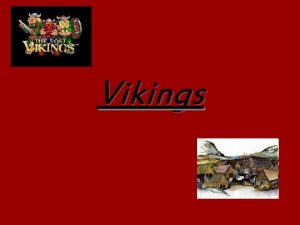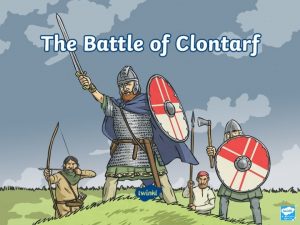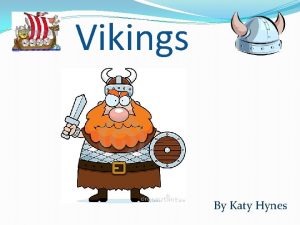AngloSaxon and the Vikings AngloSaxon Invasion AD 410





























- Slides: 29

Anglo-Saxon and the Vikings

Anglo-Saxon Invasion AD 410 - 1066


German tribes the Angles the Saxons the Jutes Christianization started around 600 AD Was completed by the mid of 8 century

By 600 AD

Offa of Mercia Reign 757 – July 796

King Offa and the Dyke 177 miles/ 185 km

Saint King Edwin of Northumbria Edwin- burh – Edinburgh

Alfred the Great AD 849 -899 AD 879 Bretwalda



West Germanic dialects old English middle English

• • • Choose the right answer a, b or c 1 Anglo-Saxons were…tribes. a) German b) Roman c) Slavic 2 Anglo-Saxons spoke…. dialects a) German b) Celtic c) Norse 3 The real “bretwalda” of England was… a) Offa of Mercia b) Edwin of Northumbria c) Alfred the Great 4 Alfred was called “the Great” because he was… a) very fat b) a powerful king c) very tall 5 Anglo-Saxons dialects were the basis for the. . . a) ancient English b) Old English c) modern English

• English - Anglo-Saxon base of common words • • • Numerals A-s Eng An one Twa two Preo three Feower four Syx six Colours A-s Eng read red grene green Family A-s Eng man sunu son modor mother Animals A-s Eng horse cu cow bridd bird

Place names Anglo-Saxon influence can be followed through place names. • For example, words ending in – ham (village) Birmingham. • words ending in - burgh (town) Edinburgh • words ending in - ton (fenced area)-Brighton, Hampton.

The Vikings

Where did the Vikings come from? • The Vikings lived over one thousand years ago and came from the three countries of Scandinavia: Denmark, Norway and Sweden.

Who were the Vikings? • Vikings were also known as the Norsemen. They were great travelers and sailed to other parts of Europe, where they traded, raided, and often settled. They were also farmers, fishermen.

When did they invade Britain? • The Viking Age in Britain began in the 9 th Century AD and lasted for 300 years. The Vikings first invaded Britain in AD 793 and last invaded in 1066 when William the Conqueror became King of England after the Battle of Hastings.

Why did the Vikings invade Britain? • Most Vikings who sailed overseas were simply searching for better land for their farms. Their land was not very good for farming. Norway was very hilly, Sweden was covered in forests, and Denmark had a lot of sandy home land.

Where did the Vikings settle in Britain? • The area eventually settled by Vikings was called the Danelaw. It formed a boundary separating Anglo. Saxon England from Viking England.

Alfred the Great and Danelaw • Rather than face defeat, Alfred the Great, king of Wessex, paid the Vikings (Danes) to leave his kingdom alone. He bought just five years of peace. Then Alfred fought and defeated the Vikings.

What religion did the Vikings follow? • The Vikings believed in many different gods, but there were three that were especially important. • Odin, the leader of the gods - god of war.

Thor, provided protection from cold hunger, giants and other dangers.

Freya, goddess of love and beauty

The Vikings • • 1. Where did the Vikings come from? 2. Who were the Vikings? 3. When did they invade Britain? 4. Why did the Vikings invade Britain? 5. Where did the Vikings settle in Britain? 6. Alfred the Great and Danelaw 7. What religion did the Vikings follow?

Words of Norse origin The core of English Anger, bag, birth, window , root seem, both, can, cast, die, egg, husband, trust, want, wise, wing.

Place names ending in –by. eg. Derby, Rugby. Derby - A village where deer are found Place names ending in –thorpe eg. Scunthorpe and Grimethorpe • thorpe meant farms. • • •

The Days of the week • • • Monday is from Anglo-Saxon day of the moon. Tuesday is from Tiu, the son of Odin. (Norse) Wednesday is from Odin or Woden. (Norse) Thursday-is from Thor. (Norse) Friday is from Freya or Frigg. (Norse) Saturday is from Saturn. (Latin) Sunday is from Anglo-Saxon day of the sun. Monday and Sunday are of Anglo-Saxon origin. Tuesday, Wednesday, Thursday, Friday are of Norse origin. Saturday is of Latin origin.
 Anglo saxon period
Anglo saxon period Anglosaxon history
Anglosaxon history Old english kingdoms
Old english kingdoms Xleqxisfp definition
Xleqxisfp definition First punic war summary
First punic war summary Bay of pigs invasion on map
Bay of pigs invasion on map Cultural invasion
Cultural invasion Fertile crescent
Fertile crescent Segment invasion plan
Segment invasion plan Prostatic adenocarcinoma
Prostatic adenocarcinoma Example of invasion games
Example of invasion games Boundary invasion
Boundary invasion Contoh permainan invasion games
Contoh permainan invasion games Invasion choman hardi
Invasion choman hardi Invasion from mars characters
Invasion from mars characters The americas on the eve of invasion
The americas on the eve of invasion Which landforms protected the cities from invasion?
Which landforms protected the cities from invasion? Consecuencias de la invasión norteamericana de 1898
Consecuencias de la invasión norteamericana de 1898 How did the hun invasion weaken the roman empire?
How did the hun invasion weaken the roman empire? Invasion nocturna
Invasion nocturna Cuticle invasion
Cuticle invasion Steeven
Steeven Local invasion
Local invasion 1111 invasion des huns
1111 invasion des huns Local invasion
Local invasion Local invasion
Local invasion Bowland maths alien invasion
Bowland maths alien invasion Ashlar arch
Ashlar arch Inchon invasion map
Inchon invasion map Led zeppelin british invasion
Led zeppelin british invasion
